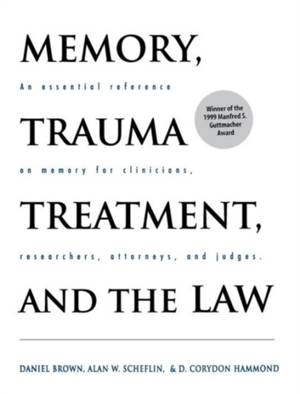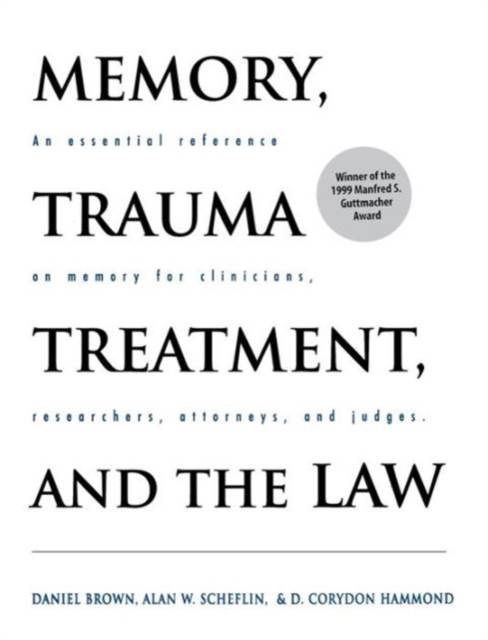
- Afhalen na 1 uur in een winkel met voorraad
- Gratis thuislevering in België vanaf € 30
- Ruim aanbod met 7 miljoen producten
- Afhalen na 1 uur in een winkel met voorraad
- Gratis thuislevering in België vanaf € 30
- Ruim aanbod met 7 miljoen producten
Zoeken
Memory, Trauma Treatment, and the Law
An Essential Reference on Memory for Clinicians, Researchers, Attorneys, and Judges
Daniel Brown, Alan W Scheflin, D Corydon Hammond
Hardcover | Engels
€ 148,45
+ 296 punten
Omschrijving
The authors critically review memory research, trauma treatment, and legal cases pertaining to the false memory controversy. They discuss current memory science and research with both children and adults, pointing out where findings are and are not generalizable to trauma memories recovered in psychotherapy. The main issues in the recovered memory debate are covered, as well as research on emotion and memory, autobiographical memory, flashbulb memory, memory for trauma, and types of suggestions, such as misinformation suggestions, social persuasion, interrogatory suggestions, and brainwashing. Research on the reliability of memories recovered in hypnosis is reviewed and guidelines for using hypnosis with patients reporting no, partial, or full memory of having been sexually abused are outlined.
The authors review the development and current practice of phase-oriented trauma treatment and present a standard of care that is effective and ethical. Their exploration of memory in the legal context includes a review of malpractice liability and current malpractice cases for allegedly implanting false memories in therapy, as well as the evolving law around legal actions by people who have recovered memories and around hypnosis and memory recovery.
This is an essential reference on memory for all clinicians, researchers, attorneys, and judges.
The authors review the development and current practice of phase-oriented trauma treatment and present a standard of care that is effective and ethical. Their exploration of memory in the legal context includes a review of malpractice liability and current malpractice cases for allegedly implanting false memories in therapy, as well as the evolving law around legal actions by people who have recovered memories and around hypnosis and memory recovery.
This is an essential reference on memory for all clinicians, researchers, attorneys, and judges.
Specificaties
Betrokkenen
- Auteur(s):
- Uitgeverij:
Inhoud
- Aantal bladzijden:
- 802
- Taal:
- Engels
Eigenschappen
- Productcode (EAN):
- 9780393702545
- Verschijningsdatum:
- 1/01/1998
- Uitvoering:
- Hardcover
- Formaat:
- Genaaid
- Afmetingen:
- 200 mm x 262 mm
- Gewicht:
- 1905 g

Alleen bij Standaard Boekhandel
+ 296 punten op je klantenkaart van Standaard Boekhandel
Beoordelingen
We publiceren alleen reviews die voldoen aan de voorwaarden voor reviews. Bekijk onze voorwaarden voor reviews.











